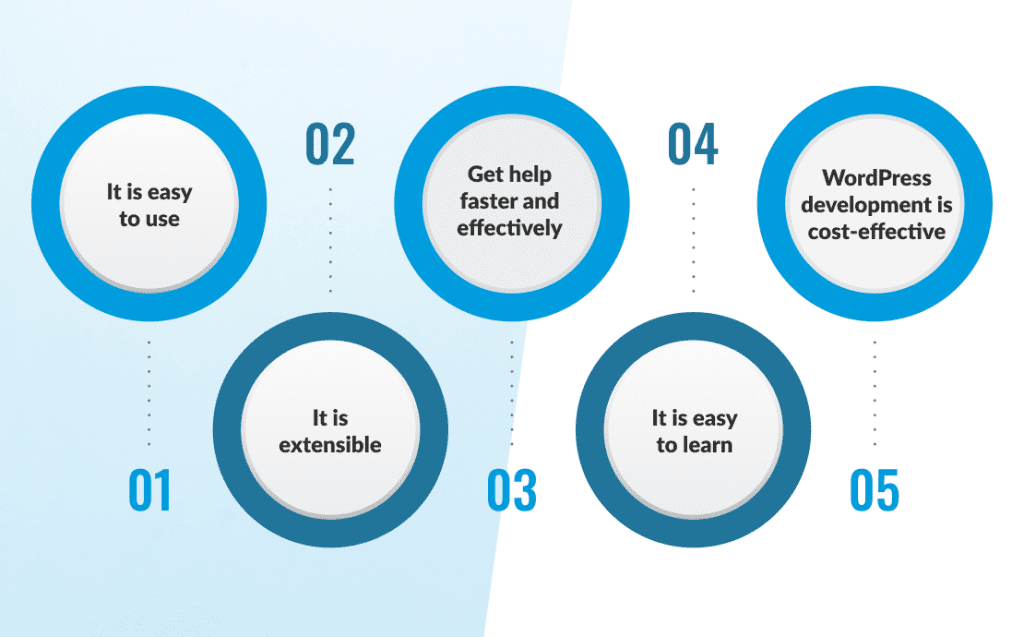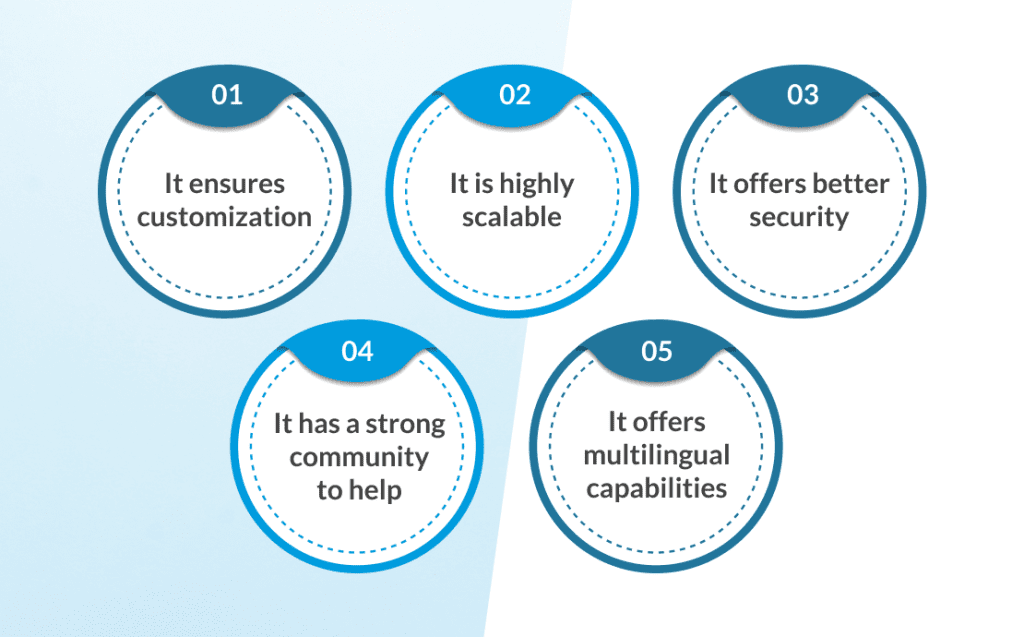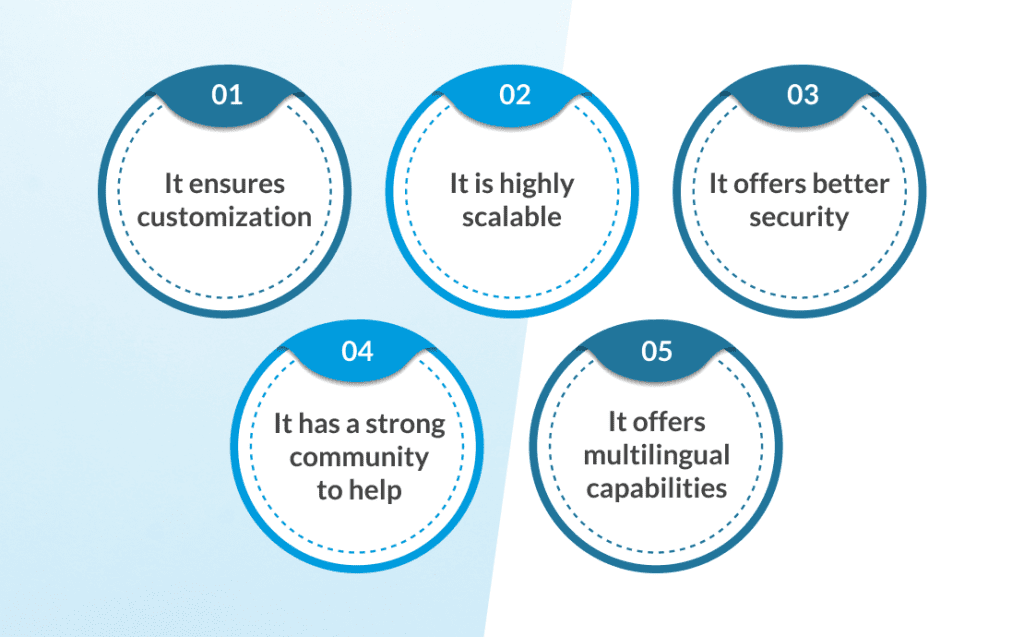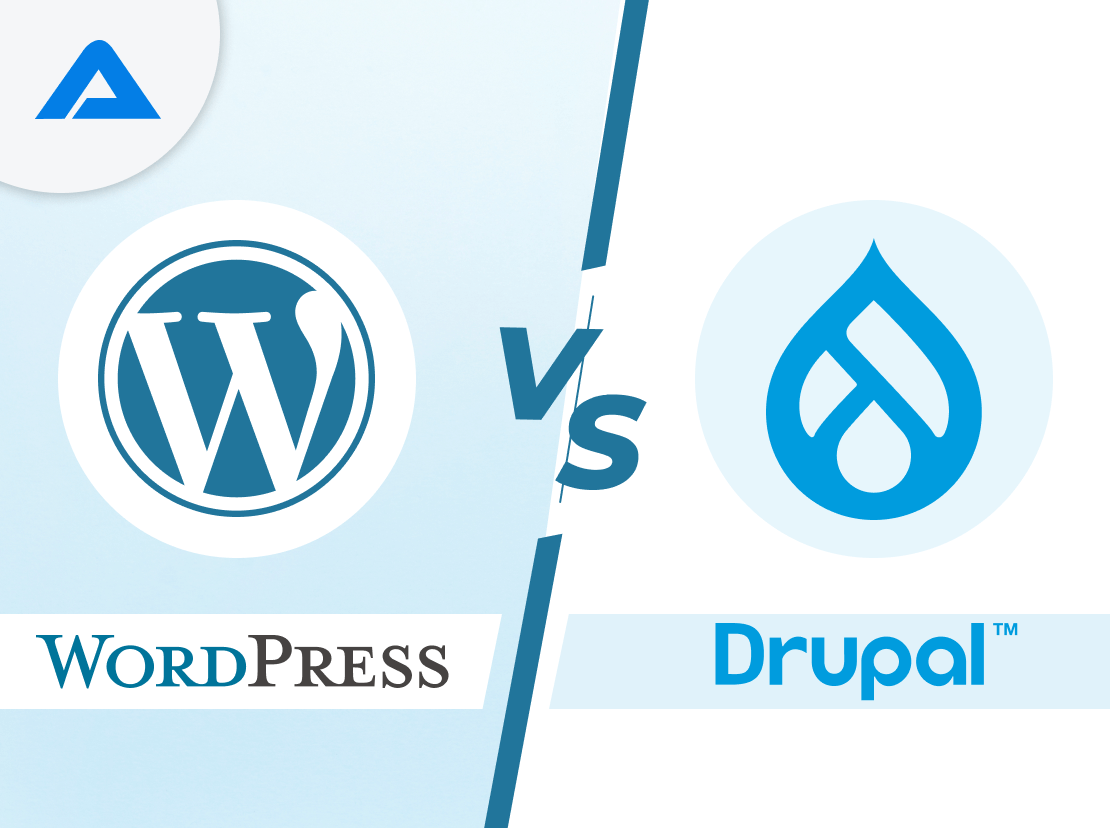When creating a content-heavy website, picking the right Content Management System is crucial. And two of the most popular CMS platforms that you may have already thought about are WordPress vs Drupal development.
While WordPress is far ahead in the industry with over 60% market share, Drupal only holds 2.2%. That’s a huge difference, right?
But if you consider each of these platforms, they are not very different in their approach to website development and content management.
And that’s what makes it hard to pick one over the other. As a hired dedicated WordPress developer, we often work with businesses with this dilemma.
We are putting the dilemma to rest with this blog post. We are covering all about both the platforms and how to pick between them.
So let’s get started.
What Are the Benefits of WordPress?

We spoke to WordPress developers in our web development team. We have found many of them prefer to work with WordPress.
Here are some of the common and crucial benefits that make them love WordPress.
It is easy to use
No one wants to spend weeks together to create a website. And WordPress gets this perfectly. That’s why it makes development such an easy task.
You can get WordPress and install a chosen theme and you are good to go. This is so efficient for non-developers.
And if you are a developer and want to customize, it is also easy to do.
It is extensible
Users can extend the abilities of WordPress due to an extensive library of themes and plugins. No matter what you want to do, you will find a plugin to help you with WordPress.
Some of our developers have said that the plugins allow WordPress to do anything that Drupal can do, and even better.
Get help faster and effectively
The challenges you come across while using WordPress have quick solutions. The huge global community of WordPress developers are ready to help you.
They regularly publish guides and tutorials to make using WordPress easier.
Even newbies to the world of website development can do it without much effort.
It is easy to learn
The learning curve of WordPress is short. Anyone can learn to use WordPress rather quickly without any exposure to website development.
This makes WordPress a go-to CMS option for most small businesses and newbie website developers.
And that’s without the hassles of customizations.
WordPress development is cost-effective
Creating a website with WordPress is much more affordable than creating a site with Drupal.
There are many plugins and themes free to use. And you can run a feature-rich website with these free plugins.
This is also why many small businesses and entrepreneurs prefer WordPress.
What Are the Limitations of WordPress?

A few of the developers who did not find WordPress impressive had the following limitations of the platform to share.
It has limited scalability.
WordPress may face performance issues as your website grows. This demands optimization and maintenance to handle heavy traffic. And you need technical expertise to do it.
It has security vulnerabilities.
Though WordPress is not vulnerable, it depends on plugins and themes. This can be a backdoor to security issues. And WordPress also needs to be regularly updated, which is also time consuming.
Performance Issues
Complex themes and plugins can hinder website loading times. And this is a huge blow on user experience. Hence one needs to invest a lot of time selecting and managing these elements.
Dependency on plugins
Many site customization features in WordPress rely on third-party plugins. Hence, one needs to make the choice carefully. The reliance leads to compatibility concerns and conflicts.
Steep learning curve
While beginner-friendly, advanced customization in WordPress can be difficult for newcomers. Such customizations need time and effort to carry out effectively.
Woocommerce Plugin Development
What Are the Benefits of Drupal?

After inquiring about WordPress, we then asked the Drupal developers in our team what they liked about this CMS.
And their responses include the following benefits of Drupal.
It ensures customization.
Drupal’s strength lies in its capacity for deep customization. It offers a wide range of tools and options that empower developers to create highly tailored websites.
The flexibility is valuable for businesses and organizations with unique requirements.
They can implement precise design and functionality elements that align with their specific needs.
It is highly scalable.
Drupal is designed to handle websites of all sizes. Whether you start with a small site or a large enterprise-level platform, Drupal can scale effectively.
It can manage increased traffic, content, and user demands without the need for major changes.
As a result, Drupal is a scalable and future-proof choice.
It offers better security.
Drupal maintains a strong emphasis on security. It undergoes rigorous testing, and its dedicated security team consistently addresses vulnerabilities.
The dedication to security makes Drupal a trusted option for websites dealing with sensitive data.
And in the long run, it ensures protection against all threats and breaches.
It has a strong community to help.
Drupal benefits from an engaged community of developers, designers, and users. The community provides a wealth of resources, from modules and themes to support forums and documentation.
The ongoing support and updates from this community help to keep Drupal up-to-date and relevant.
And the result? Long-term viability as a CMS choice.
It offers multilingual capabilities.
Multilingual capabilities are crucial for reaching diverse audiences. Drupal makes the management of content in multiple languages simple.
It is easier to create and maintain websites that cater to many language preferences in Drupal.
This feature is valuable for users seeking to expand their reach and serve multilingual user bases.
What Are the Limitations of Drupal
Despite being an excellent CMS for customization, Drupal also has its share of limitations.
Here are a few that our Drupal developers have shared with us.
It is hard to learn.
Drupal offers many customization options, intricate terminology, and features. These options can easily overwhelm beginners.
And the platform’s complexity makes it more challenging for newcomers to learn it.
Mastering Drupal requires a substantial investment in time. And even then, it can be challenging at times to use it.
It is resource intensive.
Drupal’s feature-rich nature comes at a cost. It can strain server resources, leading to higher maintenance expenses.
Websites built on Drupal need more robust hosting solutions for optimal performance.
And this is an added financial burden, especially for smaller businesses.
Limited themes availability.
Drupal provides fewer readily available themes compared to some other CMS platforms.
This is an obstacle for those seeking quick and cost-effective design solutions. Although custom themes are a necessity, it is time-consuming and costly.
And this can land small businesses in trouble.
Differences Between WordPress and Drupal
| ELEMENT | DRUPAL | WORDPRESS |
| Customization | Offers extensive customization and is ideal for complex projects that require precise control. | Provides flexibility but is generally more user-friendly, making it suitable for various users. |
| Learning Curve | Has a steeper learning curve, often requiring technical expertise to harness its full potential. | Features a user-friendly interface, making it more accessible for beginners and those with limited technical knowledge. |
| Scalability | Scalable and well-suited for high-traffic websites and enterprise-level projects. | Scalable but may require additional optimization and performance tuning for large-scale sites. |
| Themes and Templates | Offers fewer pre-built themes, often necessitating custom theme development. | Provides a wide range of pre-designed themes, enabling users to change the site’s appearance quickly. |
| Community Support | Boasts a dedicated community of developers, offering an abundance of resources and updates. | Has a vast user base with extensive plugins and themes, providing ample community support. |
| Security | Maintains a strong focus on security, with regular updates and rigorous testing to address vulnerabilities. | Security is a concern due to its popularity, requiring frequent updates and security plugins. |
| Content Types | Flexible in handling diverse content types, making it suitable for complex content structures. | Primarily designed for specific content types, necessitating plugins for more complex content structures. |
When to Use WordPress vs Drupal
Thanks to their differences, these CMS platforms cannot be used for all web development projects. But here is how you can pick them.
What’s your business type?
The type of business you are running can provide a lot of insights into what CMS platform you must choose. If you are a small business looking to build a blog or ecommerce site, WordPress suits you best.
Its user-friendly interface, short learning curve, and ease of use will help you make full advantage of the platform.
But if you need a complex site for your large business with a lot of customization options, Drupal is the ideal choice.
What are your business goals?
Understanding your goals can help you choose between Drupal and WordPress. If you are looking to grow your business and scale in the long-term, Drupal is the option.
On the other hand, if you want to set up your site faster and effortlessly, WordPress can help you.
These two elements can help you choose a CMS that’s suitable for your exact requirements. However, you can also check with your Drupal or WordPress development company to help you.
How Can AddWeb Solution Help You?
AddWeb Solution has been the go-to Drupal or WordPress development company for many businesses for years now.
The industry expertise helps us deliver the best Drupal and WordPress development services to our clients. But that’s not the only thing which makes us an ideal Drupal and WordPress development agency in the field.
Here are the most important qualities we assure.
- A team of experienced Drupal and WordPress developers qualified to develop websites for any type of business.
- An extensive quality assurance process that monitors all website development projects for our clients.
- Multiple WordPress and Drupal development services customized to meet the needs of small and large businesses.
- Different service engagement packages to help our clients pick the most suitable one to ensure maximum investment value.
- An extensive tech infrastructure capable of delivering any type of WordPress or Drupal development services for businesses.
Conclusion
Our team of web developers have concluded that the choice of the platform depends on the project. What the client wants. What the website needs at the end of the day. Hence, the choice needs to be made considering the project and its goals. Such a choice would help the business to create a website that will cater to the requirements of their business and the customers.
At the same time, you also need to work with a pioneer web development company to ensure full use of the platforms. With more than 10 years of experience, AddWeb Solution can help you.
You can learn more about how we can help you by talking to our client service team.
Speak now.

